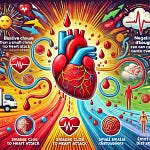Welcome back to another episode of Superdoc Insights, where we dive deep into critical care stories and reflect on life lessons through the lens of Philosophy, Physiology, and Psychology. 🧠💡
In today’s post, we’re going to explore the intricate connection between the medical world and our personal growth journeys. Through powerful ICU stories and introspective moments, we’ll dissect how these three aspects come together to shape our decisions, health, and mindset
Philosophy: What larger lessons can we learn about life, growth, and purpose from today’s story?
Physiology: How does the body respond in critical situations, and what can it teach us about resilience and balance?
Psychology: How do emotional and mental blocks impact our success, and how can we navigate these challenges for better outcomes?
Whether you’re a medical professional or on your own personal journey, this blog is for anyone who’s looking to grow, learn, and reflect. So, let’s jump in and explore the 3Ps together! 🔍✨
Critical Care Story: Revisiting a Moment of Masculine Energy
If you’ve been following my previous blogs, you might recall a case I discussed earlier—the one involving a 55-year-old male with stage 4 oropharyngeal cancer who presented with stridor and quickly spiraled into a life-threatening condition. I want to revisit that story today and reanalyze it through the lens of masculine and feminine energies, something that I didn’t focus on initially but has been resonating with me deeply since.
For those unfamiliar, here’s a quick recap: The patient underwent an emergency tracheostomy but soon after developed a tension pneumothorax. It was a moment where the masculine energy—marked by action, decisiveness, and control—came to the forefront. Every move needed to be precise, protocol-driven, and rapid. The ICU setting often forces us into this dominant masculine role, where there’s little room for hesitation or reflection.
But, as I reflect back on this case, I realize that while the masculine energy was necessary to act swiftly, there was a point where it became equally important to shift into a feminine energy—the energy of empathy, intuition, and nurturing—particularly when communicating with the patient’s family. I’ll talk about how I shifted to this balance later, but for now, let’s break it down using our 3P framework.
Philosophy: The Balance Between Masculine and Feminine Energies 🌿
The philosophy here is clear: In life and in medicine, we need a balance of both masculine and feminine energies to thrive. When we operate solely in masculine energy—focused on control, action, and logic—we might overlook the importance of empathy, softness, and nurturing.
In critical care, this balance is especially vital. The masculine energy allows us to take control in high-pressure situations, making swift, life-saving decisions. But the feminine energy reminds us to step back, observe, and listen, not just to the patient’s physiological signals but also to their emotional and psychological needs. 🌸
As I reflect on this now, I think about how the family’s desperation in this case could have pushed me into a purely logical mindset, trying to figure out solutions. But sometimes, solutions come not from action, but from empathy—and that’s a lesson worth reflecting on in both medicine and life. How often do we over-focus on outcomes, when what’s truly needed is connection and understanding?
Physiology: Responding to Crisis in the ICU 💪⚕️
From a physiological perspective, this case required quick thinking and sharp decision-making, especially when the patient developed a pneumothorax post-tracheostomy. The patient’s respiratory distress was severe, and in moments like these, you have no choice but to lean heavily into masculine energy—taking rapid action to ensure survival.
The physiological demands on the patient’s body mirrored the demands on the medical team: high pressure, fight-or-flight mode, and a focus on stabilizing vital signs. In this space, the masculine energy of taking control is essential. I remember how every moment was about solving the immediate crisis, ensuring the ICD was in place, and then troubleshooting when things didn’t go as expected.
But physiology also taught me another lesson here. After stabilizing the patient, I shifted into feminine energy by employing patience and letting the body reveal its next steps. 🧘♂️ After multiple rounds of action, the ICDs weren’t functioning as expected, and the patient’s condition seemed to plateau. That’s when I had to step back, observe, and allow the body to show us where the true issue lay—leading us to the surprising resolution of a mucus plug being the hidden cause.
Psychology: Navigating Emotional Blocks 🧠💭
Psychologically, this case was a reminder of how easy it is to get caught in the dominant masculine mindset, especially in high-stakes environments. As the situation escalated, I was so focused on the patient’s immediate survival that I almost lost sight of the emotional journey the family was on.
This case made me question how often I’ve leaned too far into masculine energy in other areas of my life—focused on achieving results, making decisions, and pushing forward. I think back to my NEET SS preparation when I was driven by the need to control my outcomes, to chase ranks, and to secure my place in the medical world. It was only later that I realized how emotional burnout and mental blocks were my own confounding factors—holding me back from reaching my full potential. 🌪️
Just like in the ICU, where I had to switch from a masculine energy of action to a feminine energy of empathy with the family, I had to learn to balance those energies in my own life. It was only when I embraced my feminine energy—allowing myself space to reflect, care for my emotional well-being, and trust my intuition—that I began to see true growth. 🌱
Conclusion: Finding Balance in Life and Medicine ⚖️
In both critical care and life, we need to balance our masculine and feminine energies. In moments of crisis, it’s the masculine energy that drives action and saves lives. But to truly thrive, we must also embrace our feminine energy—to listen, reflect, and nurture the emotional and psychological aspects of care.
So, I invite you to reflect on your own life. Are there areas where you’re too focused on action, control, and results? Are there places where you need to slow down, listen, and reconnect with your emotional and intuitive side?
Stay balanced, stay healthy, and remember—true success comes when we embrace both the action of the masculine and the intuition of the feminine in all aspects of our lives. 🌿
Dr.Krishna Bharath,MD
PS: If you are a resident looking to Unfold your True potential ,Become Unbreakable in pressure situations and achieve goals at accelerated pace Join my free webinar in December.














Share this post